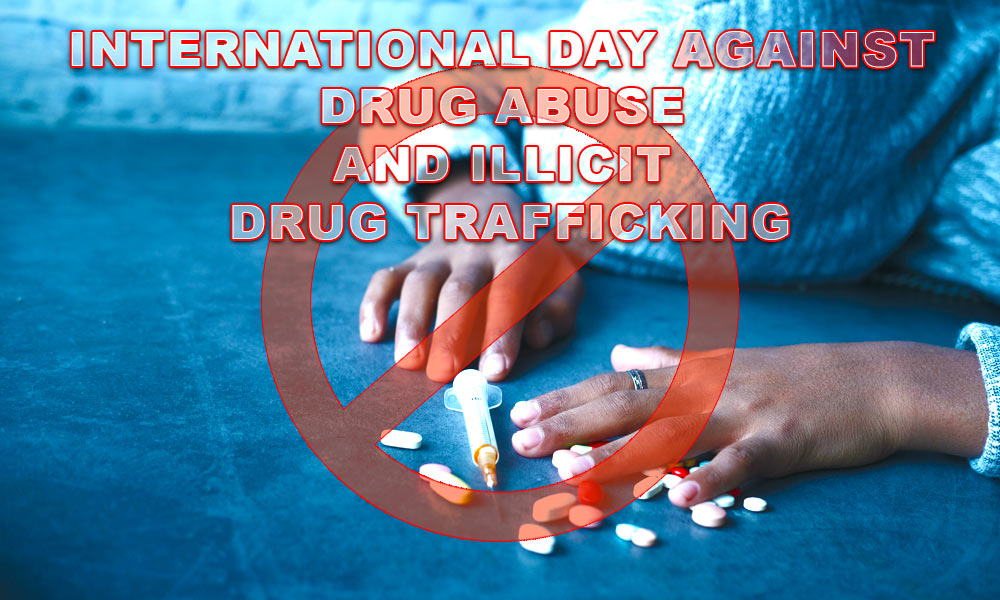Every year, on June 26th, the world unites to observe the International Day Against Drug Abuse and Illicit Drug Trafficking. This significant day serves as a reminder of the global struggle against drug abuse and the illegal drug trade. It provides an opportunity to raise awareness, promote effective strategies, and mobilize communities to combat this pervasive menace that affects individuals, families, and societies worldwide.
Drug abuse and illicit drug trafficking pose serious threats to public health, social stability, and economic development in countries across the globe. These issues are interrelated, with drug abuse fueling the demand for illicit drugs, which in turn drives the illegal drug trade. This illicit trade not only perpetuates addiction and crime but also funds organized crime syndicates and terrorist organizations, threatening security and stability on a global scale.
Table of Contents
History
The International Day Against Drug Abuse and Illicit Drug Trafficking was established by the United Nations General Assembly in 1987 to strengthen international cooperation in addressing this complex problem. The day serves as a platform for governments, organizations, and communities to come together, share experiences, and highlight the importance of prevention, treatment, and rehabilitation.
Prevention plays a crucial role in combating drug abuse. Education and awareness programs are vital in empowering individuals, especially the youth, to make informed decisions and resist the allure of drugs. Governments and organizations must invest in evidence-based prevention initiatives that address risk factors such as poverty, unemployment, social exclusion, and mental health disorders. By promoting healthy lifestyles, nurturing supportive environments, and providing opportunities for personal growth, we can create a strong foundation for a drug-free society.
Prevention and Treatment
Equally important is the availability of quality treatment and rehabilitation services for individuals struggling with drug addiction. Drug dependence is a complex health issue that requires a comprehensive approach encompassing medical, psychological, and social interventions. Governments must ensure access to affordable and culturally appropriate treatment options, including detoxification, counseling, and aftercare services. Support networks for recovering individuals, including peer support groups and community-based organizations, play a vital role in promoting long-term recovery and preventing relapse.
Addressing the illicit drug trade necessitates international cooperation and law enforcement efforts. Governments must strengthen their legislative frameworks, enhance intelligence sharing, and improve border control measures to disrupt drug trafficking networks. Collaborative efforts, such as joint operations, information exchange, and capacity building, are crucial in dismantling transnational criminal organizations involved in drug trafficking. Additionally, international cooperation is essential for promoting alternative development initiatives that provide viable economic alternatives to communities affected by drug production.
Conclusion
To achieve lasting progress in the fight against drug abuse and illicit drug trafficking, it is crucial to adopt a balanced and comprehensive approach that includes prevention, treatment, law enforcement, and international cooperation. Governments, civil society organizations, and individuals must work together, breaking down silos and sharing best practices to address this multifaceted challenge.
On this International Day Against Drug Abuse and Illicit Drug Trafficking, let us reaffirm our commitment to building a drug-free world. Together, we can create a society where individuals are empowered to make healthy choices, communities are resilient, and the global community stands united against the scourge of drugs. By fostering understanding, compassion, and collaboration, we can bring hope and support to those affected by drug abuse and work towards a brighter future for all.
Author
Stay connected for new publications, events, and more.








More Stories
Le pape Léon XIV : un pontife historique qui jette un pont entre les continents et les cultures
What Happens When a Pope Dies
Le Prix de la Liberté : 17 Avril 1825, une Ordonnance Injuste. Déclaration de Macron